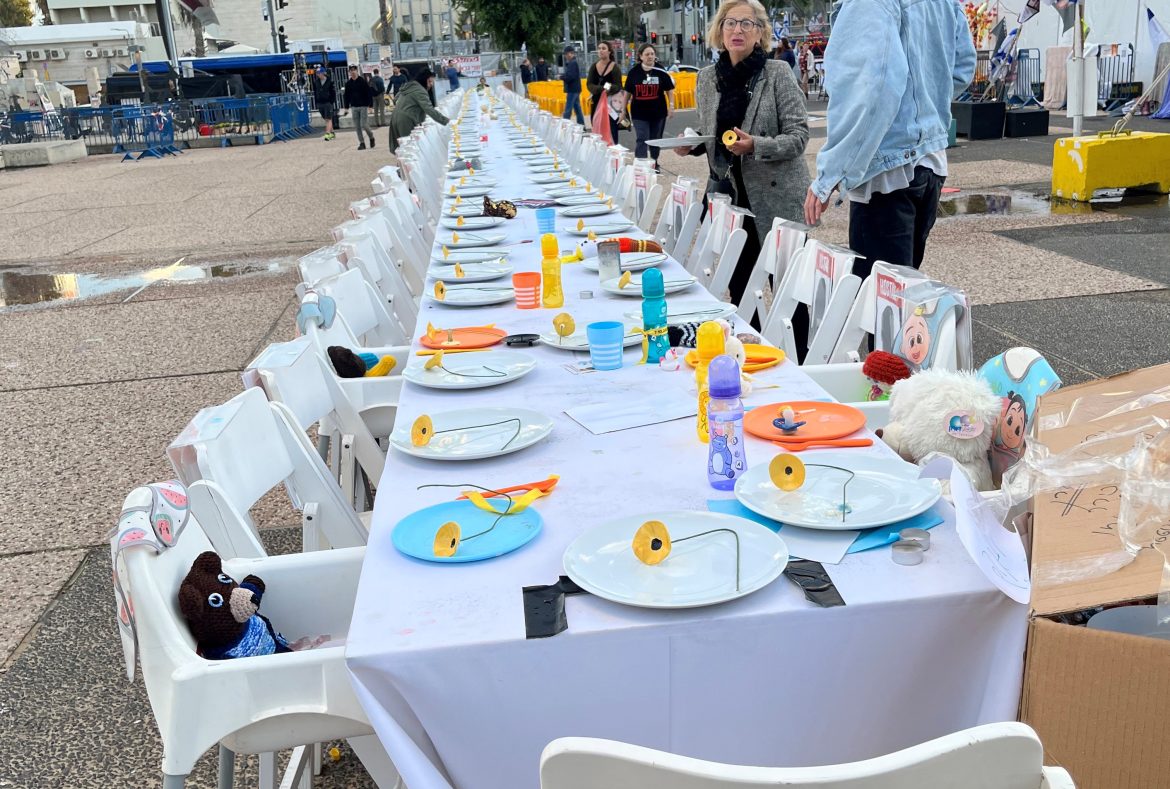How Will This Year’s Passover Be Different for North Carolina’s Jews
Tonight, Jews across the globe will begin their observance of Passover with seders – festival meals accompanied by a retelling of the Exodus narrative through stories, symbolic foods, and songs. It is one of the most widely observed Jewish practices. While the holiday is meant to be festive, this year’s celebration will be tempered by current somber reality.
In the wake of Hamas’ massacre of 1200 people on October 7th, and in the midst of the Israel-Hamas War, many of us are grappling with how to adapt our ancient holiday tradition to this present reality.
Rabbinic teaching guides our Passover observance: “In every generation, a person must see themselves as having gone forth from Egypt.” In living this instruction, many of us will bring today’s struggles to our table conversations.
October 7th shook our Jewish world. The deadliest day in Jewish history since the Holocaust, its destructive aftershocks continue to reverberate. For many Jewish North Carolinians, the past 198 days of the war between Israel and Hamas have been personal and painful. There are North Carolinians who have relatives and friends who were among the 360 young people murdered at the Nova Music Festival. My cousin was among them. There are North Carolinians with relatives and friends being held hostage. There are North Carolinians with family who serve in the Israel Defense Force. And there are North Carolinians, like myself, who have close Muslim colleagues and peers who are also deeply grieving – having lost relatives and friends who are innocent civilians in Gaza.
The aftermath of October 7 has also brought a surge of antisemitism, what American historian Jonathan Sarna described as a “tsunami of hate.” Due to the intense spike in antisemitic incidents after October 7th, the Anti-Defamation League reports that antisemitic incidents are at an all-time high since they began their tracking in 1979. In 2023, there was an average of one antisemitic incident every hour every day. Verbal and physical assaults continue to this day. Many Jews, especially on college campuses, are afraid to share their identity.
Our Jewish tradition encourages children to ask questions about the elaborate Passover rituals in order to learn about our liberation. This year, as adults, we are also asking many questions: How can we celebrate when Israel is at war? How do we celebrate freedom when so many aren’t free? How can we sing when so many are suffering?
Many of us will have an empty chair at our tables for the 133 hostages who remain or have been killed in Gaza. The hostages are from 25 countries. They are Christian, Buddhist, Muslim, Hindu and Jewish.
We will dip parsley in salt water to remember not only the tears shed during Jewish enslavement in ancient Egypt, but those being shed today by the bereft and by those living in fear of continued attacks from Hamas, Hezbollah, and Iran.
We will acknowledge the ways in which the war has brought conflict and suffering on both sides of the Gaza border wrought by Hamas. Freedom is needed for Israelis and for Palestinian civilians.
This past Wednesday, Rachel Goldberg-Polin, whose 23-year old son Hersh has been held as a hostage in Gaza for more than six months, presented on a pre-Passover webinar to 1300 members of the Reform Jewish movement.
“We can hold two truths at the same time.” Rachel said, “I have said since day one, ‘I am terribly concerned and worried about the innocent Gazan civilians” and you can also say, ‘I am worried about the 133 hostages who were dragged across the border 194 days ago. I am worried about both those peoples. Of the hundreds of thousands of innocent civilians suffering, I only know one of them and his name is Hersh.’ People need to stop thinking this is a bifurcated issue. This is a humanitarian issue.”
As part of the seder, we offer psalms of praise. We will thank God for the apparent miracle that Israel, with the assistance of an international coalition, was able to defend against 99% of the missiles launched by Iran. And we will give thanks that the US House has passed funding to ensure Israel’s security and provide humanitarian assistance to Gazan civilians.
At seder, we traditionally sing a song of gratitude called dayeinu, meaning “it would have been enough for us.” Each step along our journey from Egypt to the Promised Land would have been enough.
We can ask ourselves, “What would be enough for us today?”
It would be enough if people took time to listen to Israeli and Palestinian narratives and sought to understand the nuanced history of that region.
It would be enough if the hostages were brought home.
It would be enough if Israeli and Gazan civilians could sleep safely in their homes.
It would be enough if our Jewish neighbors could wear their Jewish stars or kippahs and our Muslim neighbors could wear their hijabs, all without fear.
It would be enough if Hamas would put down their weapons and Palestinians could have leaders that make their central mission the building of a peaceful Palestinian State rather than the destruction of Israel.
It would be enough if the Israeli Defense Forces would withdraw from Gaza confident that Israeli citizens are safe.
It would be enough if we could work together toward peace.
Click here to read our 2024/5784 North Carolina Jewish Clergy Association Seder Supplement.



2 Comments
Ellen Martin April 22, 2024
Such an important point and it’s so important to hold 2 truths at one time.
Rabbi Judith Schindler April 27, 2024
Thanks! Chag sameach.